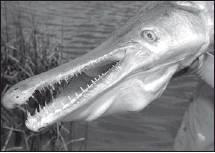Outdoors
Beginning Aug. 15, rod and reel anglers and bow fishermen can apply for a limited number permits available to harvest trophy class alligator gar from the Trinity River under new regulations adopted last spring by the Texas Parks and Wildlife Commission.
Applications for 150 permits will be accepted through September, according to Ken Kurzawski, manager of regulations and information with TPWD’s inland fisheries division.
Each permit allows for the harvest of one alligator gar longer than 48 inches using rod and reel or bow and arrow. All harvests must be reported within 24 hours using the My Texas Hunt Harvest app on a mobile device or the department website.
There is no fee for the permits. Applications may be submitted through the TPWD website.
Winners of permits will be selected by random computer drawing and notified by mid-October. The permits are not transferable and will be valid through Aug. 31, 2020, Kurzawski said.
The limited permits are part of a series of new alligator gar regulations that will go into effect Sept. 1. Other new gar regulations include:
Prohibit the harvest of alligator gar longer than 48 inches on the stretch of Trinity River between Interstate 30 in Dallas and Interstate 10 without a permit. The new rule does not impact rod and reel catch and release fishing of large gar year-round on the Trinity River.
Persons who take an alligator gar from Texas’ public waters are required to report the harvest to the department within 24 hours of take. Falcon Lake anglers are exempt from mandatory reporting.
The take of alligator gar or possession on the Trinity River at night while using archery gear or crossbows is prohibited, unless using a harvest authorization through the drawing system.
Once plentiful across the South, native alligator gar populations in some states have undergone a rapid decline or been wiped out over the years due to heavy fishing pressure from commercial operations or careless anglers who consider it a “rough” fish with no sporting value.
Texas is believed to be one of nation’s last strongholds for the prehistoric-looking fish with dagger-like teeth. The fish can be found in rivers and reservoirs all over the state, but the Trinity is regarded as one the best spots to catch big ones. Adult alligator gar fish have been known to grow beyond 8 feet and to more than 300 pounds.
Current law limits anglers to one alligator gar per day on all Texas waters with the exception of Lake Falcon, where anglers are allowed five per day.
The restrictive limit was put in place statewide in 2009 to protect the fish from the possibility of overharvest that scientists feared could happen under a historic no-limit regulation that afforded them no protection at all.
Adding to the concerns are the facts the fish may not reach sexual maturity for 10 years and they require specific spawning conditions that don’t exist every year.
TPWD adopted the new regulations on the Trinity despite having no solid research data to suggest the river’s existing alligator gar population is in trouble or that a more restrictive regulation is necessary to sustain it.


